Breathe. Focus. It’s the biggest rapid I’ve ever run. I’ve spent half an hour scouting and visualising the perfect line. I’m as fit and sharp as I’ll ever be. Still the doubts enter my head. Why am I even doing this? The adrenaline has made me feel nauseous, and I try not think of the consequences.
Everything has been checked and double-checked. I splash water on my face and launch my kayak into the river. Two or three strokes and I’m committed. Then it flows. The fear stops. Everything is in fine focus, each stroke in high definition. The thinking mind stops: in its place comes complete presence in the moment. Everything happens in slow motion. I find the perfect line and, at the bottom, elation.
I’ve been trying to write these words for nearly two years now. It is hard to write when you know what you want to say runs against the current. I’m thirty-nine, and the days when adrenaline and risk ruled my life seem from another lifetime.
For a decade, pushing my limits on Class 5 whitewater was what I lived for. I spent two seasons as a river guide on the Zambezi river in Africa in the late 90s, at a time when the sport being revolutionised.
For a decade I chased my dream around the world, pushing my personal limits. I took more than my fair share of risks. I kayaked with many of the best in the world at the time, did exploratory first descents and participated in expeditions to Iran, the Indus in the Himalayas and Blue Nile.
The line between the best day ever and the worst is a thin one, and is one I came to know only too well.
That stage of my life ended about ten years ago, and since then I have taken a different path, embracing meditation and yoga, even though the river still calls me.
II
You never feel so alive as when you are close to death. Time and again I would hear the same refrain from friends, all around the world, that ‘kayaking makes me feel alive’. It does make you feel alive, that beautiful flow state connection when time stops, the conscious mind is stilled, and you move into an higher state of awareness, totally present in the moment. The river saved me at times when everyday life seemed just too mundane, confusing or painful.
In twenty-five years of whitewater kayaking I have lost many friends to the river. I would like to say they made worse decisions than I did, but in reality, it probably came down to luck. Where once I only saw the incredible life-affirming power of adventure, I now see the consequences. You can’t teach wisdom, it only comes from experience, but this is the story of how my perspective on risk has evolved.
My experiences with death affected me deeply. These are names of friends who died on the river, great life affirming people with so much life to live: Dugald Fox Wilson, the warrior Scot and Zambezi legend, who drowned in his kayak on a raging Futaleufu river in Chile in 2003. Hendri Coetzee, the great African explorer, killed by a crocodile on a tributary of the Congo in 2010. My young friend Shane Murphy who was knocked unconscious and drowned while pushing his limits on one of Ireland’s harder rivers in flood in 2014.
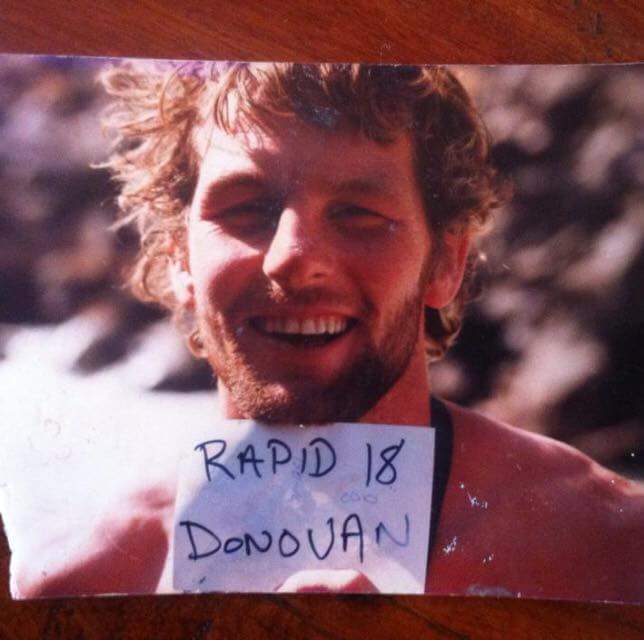
Dugald Fox Wilson
The toughest loss of all to bear was of my friend and student Conor, who drowned while in my care in a freak entrapment on an easy stretch of the Soca river in Slovenia in 2015. Despite our very best efforts we could not get him out in time.
I remember with a sickness in the base of my stomach that worst day of my life. Everything again was in perfect focus and high definition, but this time no elation, only despair. Time slowed down. It was like being in an intense, slow-motion nightmare that I couldn’t wake from. Even now, three years on, the memory is crystal clear, etched into my mind.
The sun shone that beautiful alpine spring day on our frantic, increasingly desperate, effort to free Conor from the tree. His arm was trapped, and head barely submerged: a foreboding of tragedy as the seconds ticked by, the rational mind knowing it was too late. The hopeless feeling of doing CPR for real. The years of training and experience kicking in, keeping calm. Autopilot. Looking after everyone else. The detached objective voice in my head saying ‘I never thought this would happen to me’.
The terrible logistics of tragedy. Talking to the local police. The air of suspicion. No one wanting to look you in the eye. The unbearable call to Conor’s parents to tell them he was dead. On a trip I was responsible for. The stunned silence at the end of the line. Hearing the hearts break. Nothing can prepare you for that.
Then the aftermath. Seeing how trauma affects people in different ways. The fear, anger, anxiety, depression. Looking after everyone but yourself will catch up with you eventually.
I remember too, as much as I try to forget, the chaos and uncertainty of that grim July day in 2007 as we searched the swollen Sjoa river in Norway for the bodies of two Russian rafters and six survivors strewn over miles of flooded river. Victims of bad decision-making and perhaps a cultural machismo towards death. I remember sharing a beer with them around the campsite the night before, all smiles and everyone feeling so alive.
Ian Beecroft. Niamh Tompkins. Dee Conroy. Brennan Guth. Chris Wheeler. Colm Johnson. Louise Jull. Juan Antonio de Ugarte. Gary Manwaring. Gavin Winsborrow. These are names of some of the acquaintances or friend’s of friends who have drowned on the river over the last twenty years. I could name many more. Often on rivers I had paddled. More often than not, their fate was down to bad luck rather than poor decisions.
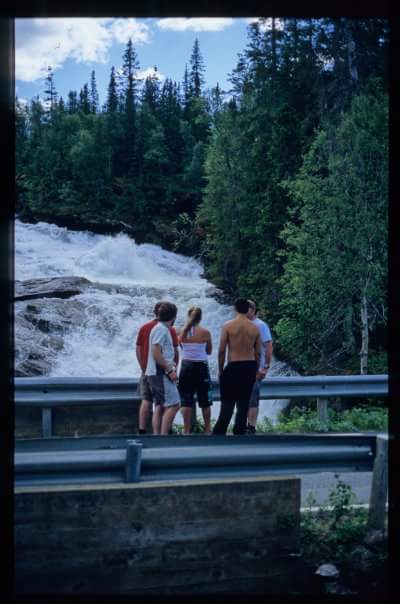
Their tragic demises shared over a late night phonecall, or email, or a social media posting of devastation and loss. Each of their deaths affected me, even those I had never met. The trauma of their loss is like a nuclear explosion to family, close friends and those who witnessed them drown, but the effects ripple around the world.
Each name does not tell the nightmare of the recovery of the body – where it was even possible – and the challenge of repatriation from remote corners of the globe.
III
Death challenges all your preconceptions. I struggled to get back on the river. I would ask myself: what for? I remembered W.B. Yeats’s poem ‘An Irish Airman Foresees his Death’, about a First World War fighter pilot
I know that I shall meet my fate,
somewhere among the clouds above
Those that I fight I do not hate
Those that I guard I do not love…
A lonely impulse of delight
Drove to this tumult in the clouds;
I balanced all, brought all to mind,
The years to come seemed waste of breath,
A waste of breath the years behind
In balance with this life, this death
I do not subscribe to that fatalistic view of life, but I understand it.
I now know that there is too much to lose. Sigmund Freud, in ‘Beyond the Pleasure Principle’, refers to thanatos, the death instinct, competing with eros, the instinct for survival. Thanatos drives us to destructive and risky behaviour. ‘The goal of all life is death’, he famously said.
Agree with him or not, many people at the extreme end of the adventure sports spectrum hold a certain fascination with death. Close encounters with mortality can be very life-affirming. Extreme sports can offer an escape from what is mundane or challenging in ‘real’ life
Dr. Gabor Mate, who has twenty years of experience working with addicts in Vancouver’s downtown Eastside, defines addiction as ‘any behaviours in which the individual finds temporary relief or pleasure in – and craves for that reason, despite negative consequences’. For most people, adventure sports offer a positive and life-affirming outlet, which brings joy into their lives. For some, however, the motivations can become unhealthy and self-destructive.
I can’t help wondering how different the narrative would be if any of my deceased friends had died from alcohol or drugs. That is not so say any of them were addicted to risk or adrenaline. Most were just unlucky. Some were well within their comfort zone. But a few took risk-taking to extremes.
IV
As someone who has worked for 15 years in outdoor education I am very familiar with the personal growth and development that comes from people testing their limits in nature. Crossing the threshold and leaving your comfort zone should be encouraged. The psychological urge for the hero’s (or heroine’s) journey to explore the limits of the known world is as old as mythology itself, as Joseph Campbell pointed out in his Hero of a Thousand Faces.
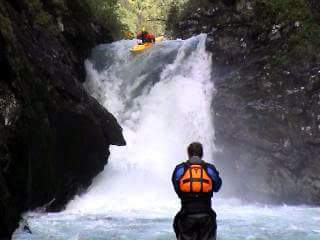
Andy Phillips and Benji Hjort on the Teigdalen in Norway, 2005
Finding your edge is a challenging process often accompanied by fear and anxiety. There is often no edge without an element of fear. In my experience the greater the fear before a new challenge, the greater the learning and reward on the other side.
The ability to distinguish between healthy and unhealthy fear is of vital importance for anyone involved in adventure sports. Since Galloway came up with the concept in ‘Inner Skiing’ back in the 1970s, sports psychologists have distinguished between healthy legitimate fear that protects us from bodily harm, and unhealthy imagined fear that is really holding us back. In reality the line between the two can sometimes be blurred.
The paradox is that extreme risk-taking, while often vilified in a modern risk-averse society, is also glorified. In the age of the GoPro hero who earns a living by social media presence, risk-taking is taken to further and further extremes. The current generation of adventure sports athletes have taken both skill levels, and risk-taking, to new levels.
Each new generation attempts to build on and surpass the achievements of those that came before. The problem is that social status among young kayakers is often based on how hard you can go on the river. Is it possible to separate personal development through adventure, from ego based or unhealthy decision-making?
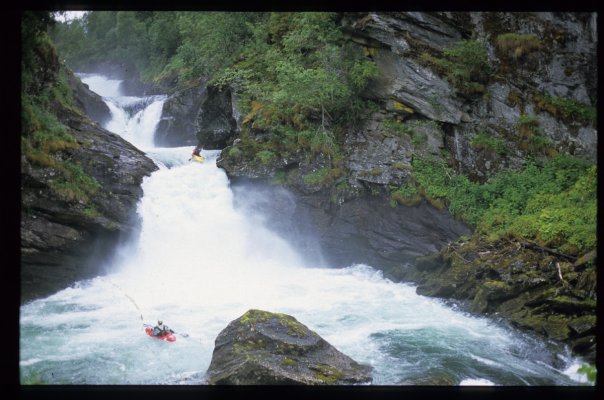
Norway, 2005
Yvon Chouinard, the founder of the outdoor clothing brand Patagonia, who was influenced by Zen philosophy, had this to say about the upper echelon of adventure sports: ‘I’ve always thought of myself as an 80 per center. I like to throw myself passionately into a sport or activity until I reach about an 80 percent proficiency level. To go beyond that requires an obsession that doesn’t appeal to me’.
The problem for the current generation is that, in the pursuit of new challenges, they embrace more and more risk. I discussed this recently with my old kayaking friend Steve Rogers in British Columbia. In our early twenties Steve and I worked as kayak guides on the Coruh river in Eastern Turkey. In that wild and free time we took many risks we were lucky to get away with.
Since then Steve has been a fixture on the British Columbia kayak scene, as well as being for a time the official photographer for Whistler/ Blackcombe ski resort. This has given him a unique vantage, in that not only had he known many generations of the world’s best kayakers, he also personally knew some of the world’s top extreme sports athletes in skiing, climbing and base jumping. All is not as well as it seems in the world of elite extreme sports.
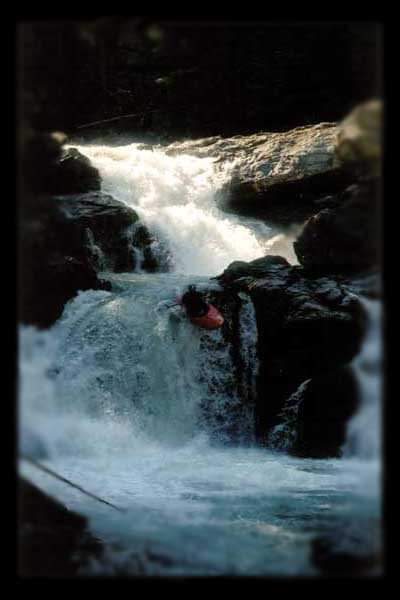
British Columbia, 2004
Steve’s take on risk is interesting. Our generation of whitewater kayakers, he said, still had plenty of new rivers to explore. For that reason, it attracted a certain rebellious and free-spirited type, who were interested in exploring rivers in remote locations. We were the last pioneers on many rivers in the early years of the new millennium, before the advent of mass hydro projects and Google maps lessened the opportunities to explore the unknown.
My own first descents in Iran and northern Norway remain peak life experiences. The feeling of literally paddling into the unknown is something I’ll never forget. Taking risks triggers dopamine release. It feels good. Really good.
For the current generation, there are fewer and fewer unrun challenges. So instead of seeking the geographical unknown they mostly push the boundaries by going more and more extreme. The new challenge is to run a river at its highest level, or faster than ever before. This, of course, hugely increases the risk.
I certainly admire their skill: doing multiple laps of formidable whitewater runs in record times on former test pieces like the Stikine, the minus Rapids on the Zambezi, or the Rondu gorges of the Indus, are awesome technical, physical and mental feats.
My generation ran those rivers too, sometimes at huge flows. But the difference now is the frequency. Those were once in a lifetime experiences for the kayakers involved. Now these river get run at record flows, more often and faster than ever before.
Social media plays a part too. We generally see highly talented athletes, at the peak of their powers having a good day, making very dangerous things look easy. Less often do we see the crashes and near misses.
Both Steve and I felt lucky to have gone through our peak years of crazy before the arrival of the GoPro camera and social media. As young men and women we all need to test ourselves as a rite of passage. In the past, manhood was proved by courage in the hunt or on the battlefield. What are our modern day rites of passage?
A pioneer of adventure education in the UK, Colin Mortlock, has long championed the personal growth inherent in the adventure experience:
‘Thirty years of experience with adventure in the outdoors has convinced me, that not only is there an instinct for adventure in the human race, but that failure to provide a suitable outlet for this instinct in the younger generation, has made a marked contribution to the sickness of western living’.
He identifies the potential lessons when things go wrong, saying ‘the misadventure experience can be a most valuable teacher. Nature teaches in a much more powerful way than a human teacher.’ However, he balances this with the argument that the goal of adventure is not fame or glory, but self-awareness and humility.
V
As a recently graduated psychotherapist I have witnessed the mental health challenges from depression to PTSD among adventure sports athletes, as they readjust to a less extreme life. It was only when a caring, wide-eyed Canadian girl asked me, after I had tried to surf a notoriously dangerous Mexican beach break at night after way too much mescal: ‘do you have post-traumatic stress disorder’, that I realised I too might have a problem.
My own transition out of kayaking was difficult. It had been my life and identity for over a decade. I still kayak frequently, and sometimes challenge myself, but now I enjoy much more just being on the water with my friends, or simply being in nature. A few years ago I solo circumnavigated Ireland by seakayak, an experience that held its fair share of hazards, as anyone familiar with the power of the north Atlantic will attest. But as I grow older an egotistic desire for status and recognition has been displaced.
That is not to say it has disappeared, for the ego is a many-headed hydra. You think you have chopped it off, then it re-appears in another form. But the difference is that I now kayak for myself. I don’t have anything to prove to myself, or anyone else. I have a few photos and a video from my Irish voyage, for myself, not for social media. It was the best trip of my life.
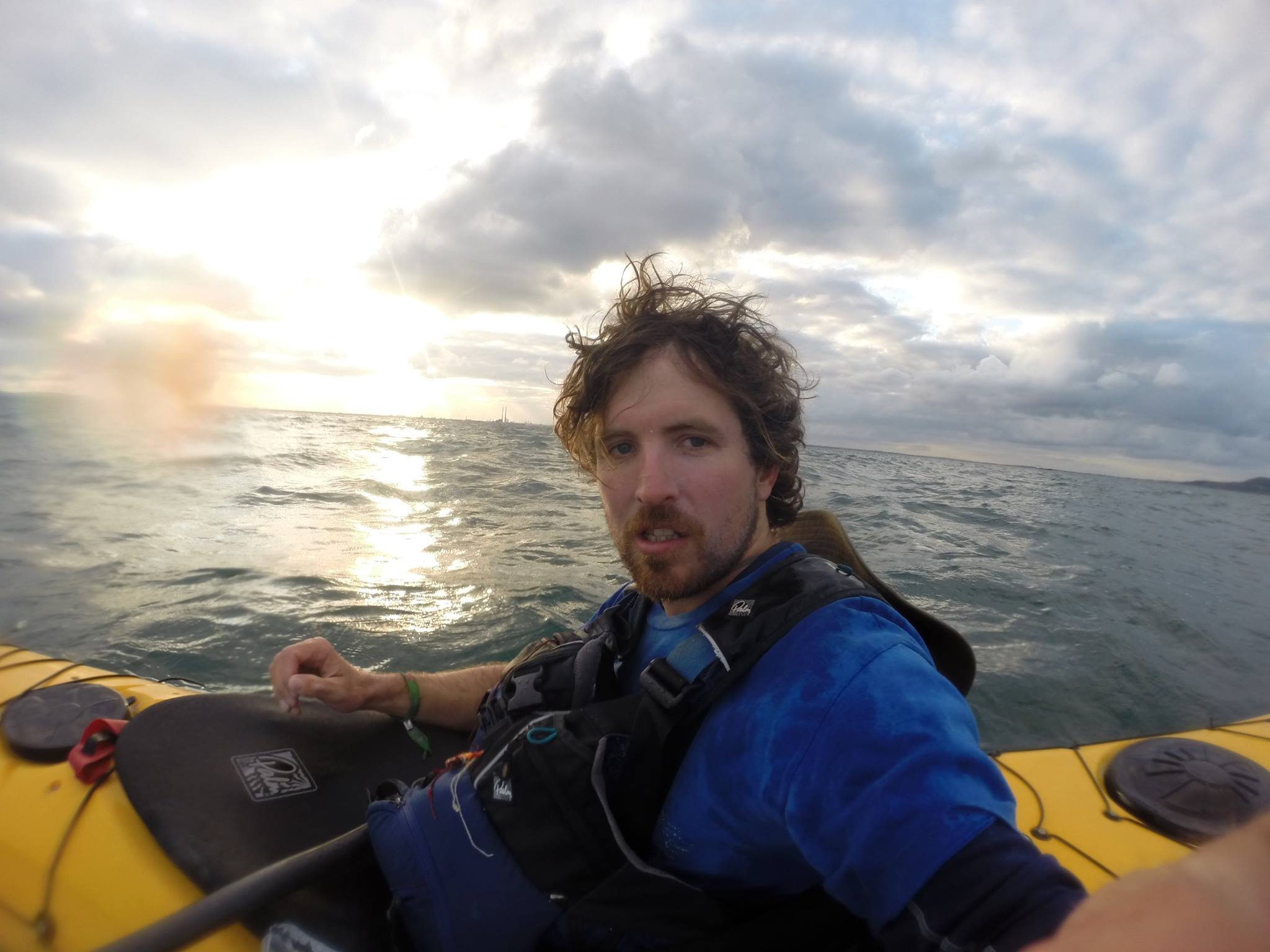
Solo seakayaking around Ireland, 2014
If you push your limits for long enough, you’ll eventually find them. I encountered mine in 2007 on an ill-advised descent of Amot Gorge on the Sjoa river in Norway in raging flood. I came within seconds of blacking out and drowning. The river was way too high, too much water compressed into too narrow a gap with nowhere to go but back on itself.
Only luck saved me that day, a roll of the dice, a surge of the river and I too would have joined my friends who died on the river. But I lived. The experience humbled me.
The river taught me everything I know. Eventually even the hard lessons of humility and respect.
Much as I’d like to say otherwise the fact I am still here, and some of my friends are not, is down to luck. I’d say if they are honest with themselves most of my generation who pushed their limits in adventure sports would say the same. We all had times when we lost control. Whitewater is surprisingly forgiving, until one day it’s not.
VI
It is much harder to see the beauty in the everyday. To seek for what great minds of East and West call the middle way, a path of moderation avoiding extremes. Aristotle called this the ‘golden mean’, and Buddha the ‘middle way’. The tale of Icarus who flew too close to the sun reminds us of the perils of excessive risk-taking.
Our culture rewards being the best, the first, the greatest. People are often conditioned to measure their self-worth against what they achieve, rather than finding an intrinsic value in being themselves. In the testosterone-heavy-environment of my early twenties on the Zambezi, status came from skill levels and courage. I have learnt since then that it is better, and wiser, to value a person for who they are and how they treat others.
Who cares how good a kayaker/ surfer/skier you are if in your personal life you leave a trail of destruction behind you? After my river years, I ended up living on Maui, Hawaii, the world centre of big wave surfing. My friends there who had firsthand experience with the Mavericks and Peahi scene told me of the dysfunctional personal lives of some of the big wave surfers. On the flat days many turned to drugs to fill the void. I heard the same story when I was in Puerto Escondido in Mexico. The struggles of legendary surfers like Andy Irons and Darryl Virostko with drug addiction are tragic and well-documented.
Taoist philosophy places a major emphasis on balance and the harmony of yin and yang elements: if you push too hard be prepared for the response. Karma, very simply, means the same thing. Every action has its consequences. Often, people take risks for the sake of short term exhilaration without acknowledging long-term consequences. The consequence of dying young, no matter how gloriously you have lived, is a lifetime of heartbreak for the relatives and friends you leave behind.
Writing this, I am conflicted. Part of me remembers how good it felt to be that free, to take those risks and feel immortal. I returned to the Zambezi last summer for the first time in 16 years, and running Rapid 9 again still felt like one of the peak experiences of my life.
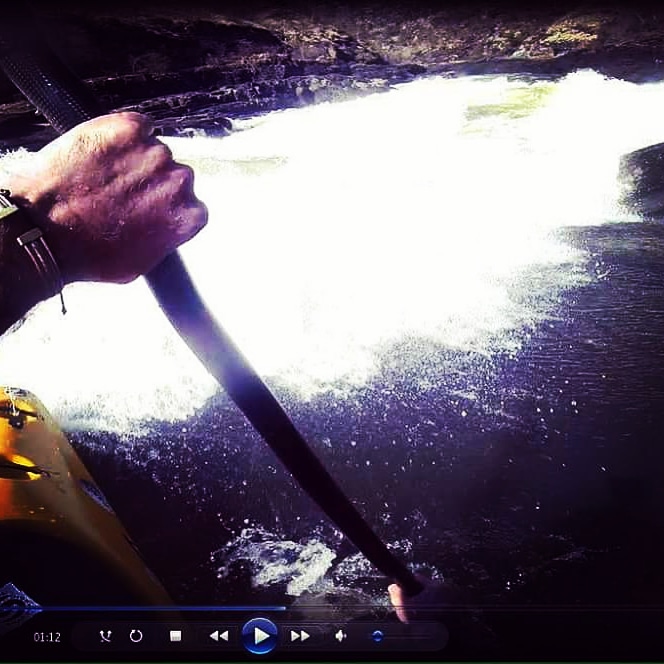
Hitting the diagonal on high water Rapid 9, Zambezi, 2017
I still feel the draw of the river. But I’m older and wiser now: I know the trauma of losing loved ones. I do not regret for a minute the risks I took. But I now realise that the path to genuine happiness lies in balance and harmony, not extremes. That most wise of ancient books, the Tao Te Ching states the ‘sage casts off extremes’, likewise Aristotle counted ‘him braver who overcomes his desires than him who conquers his enemies, for the hardest victory is over self’.
So take risks, explore your limits, learn about yourself by overcoming fear. Be aware, however, that it is not being the best, or going the hardest, that defines you as a human being. Sometimes it is better to walk away. Life is beautiful and very much worth living. A shot of adrenaline is not worth the price of a life.
Flow state can be found in the everyday, in being present in the moment. The closing words I leave to my friend Hendri Coetzee, the African river warrior, who took more risks than most, and for a time seemed invincible. Before his last, ill-fated expedition to the Congo, the one he would not return from, he sent me an email in which he said it would be his last major expedition. He looked forward to exploring other aspects of his life having ‘finally realized that my search for adventure was a search for the Stillness that I found in the eye of the storm’. That realisation of stillness comes to us all eventually, for some it is just too late.
…………………………………………………………………….
A film made by the author of kayaking adventures around the world 1999-2001

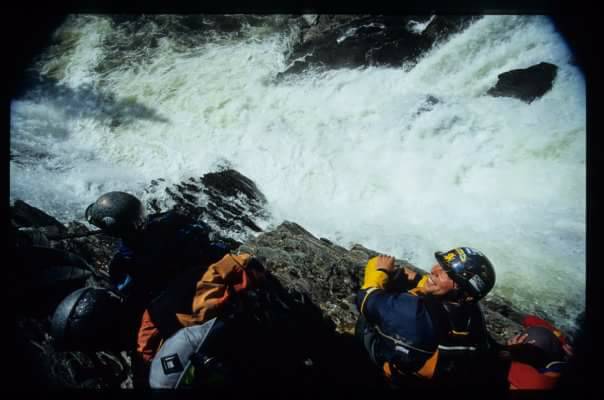


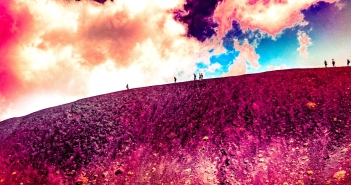
27 Comments
Brilliant reading and video, it’s a honor to be one ov your students.
“Absolutely and utterly incredible”. The truth is “They don’t make them like they used ta” well done to all an amazing achievement.
Wow! Great writing!!
I’d likr to share this on the American Whitewater Safety Page. How can I get permission?
You are free to copy and paste the link into the site.
That would be great Charlie, share away. Thanks
A brilliant piece of writing Rob, and a reflective account which I, and some of my peers, can relate to. Thanks for sharing!
Carl
The only text of this kind that actually mean something to me
Thank you for sharing your stories. For me it is particularly nice to see your words reflected in my research. Such stories need to reach a wider audience.
https://www.amazon.co.uk/Phenomenology-Extreme-Experience-Routledge-Research/dp/1138957615
Great piece of reflection Rob, as I reach the end of a 30year career in the outdoors and many personal adventures on the rivers and in the mountains your article struck many chords.
Hey Rob, thanks for sharing your experience and wisdom….. Awesome footage of that fine line we all struggle to understand, but greater still the clarity with which you describe the life lessons we all face throughout our journey……. As a past student of yours and as a result of questions you got me to ask myself…… I’ve found that both “courage to live” and “balance to survive” are the keys which I found through our brief yet awesome encounters……. Many thanks for sharing.
Sean
Very well written and poignant. I’m pretty sure one of those clips was of a guy getting hammered in the hole just to the right of dragons back At very top of rapid number 4, Zambezi. At age 54 I just experienced that same beat down in a rock star (Only boat we could get on the plsne out of NYC.) 30 seconds in the no-oxygen zone and the closest I’ve ever come to drowning in this sport. Before that the closest I came was 32 years ago when I got my foot thoroughly entangled in a ball of fishing line at the bottom of the Potomac Great Falls Virginia under the Virginia side spout.
I’m going to take less risk going forward. Love the wisdom that your words expressed. Loved the article and loved the videos!!
Maybe just go bass fishing with EJ going forward!!
Thanks Eric. Rapid 4 indeed it was
Nice piece Rob.
I am sitting in Maria’s driveway having barely slept in the last 48 hours and with few tears left asking myself these very questions. The answers are not simple. We have lost so many. This life and the people that we have found are soo incredibly sweet but every once in a while it is unbelievably bitter.
Thank you Rob.
Shane
Thanks Shane, I heard the news about Maria. Very sorry for your loss
I flew jets , Marine Corps for 12 years . I read your writing and replaced river / water with Sky and Kayaking with Flying … I am now 54 and no longer need to test … each day death or life … I have found that quiet balance of being still in the present . Our paths in life were Parallel.
Rob, insightful words, superbly written.
Not sure I was ever even an eighty percenter, but a great read and all we can do is keep the memories… We’ve all got to go sometime but let it be the right time. cheers
For all my friends that didn’t get to the take out farewell. A beautiful tribute to rivers and adventures past. Now the joy is in the beautiful places we share in our memories
Wow Bobby, just wow! Recently I found myself having numerous discussions on this topic with many of our common friends. You’ve managed to sucesfully capture a narrative in words that I believe many of us have been struggling to pull together recently.
I have read this several times, it is great, much food for thought. And whilst being on the inside and outside of some of this narrative, much can be said. The single mindedness, the focus, the here and now to makes the decision, the line and goal so pure, is such a wonderful thing. Yet to witness poor luck and to lose on the river, is a heavy burden to endure.
Thanks Simon. Hope you and Satu are well!
This is actually helpful, thanks.
Thanks to the wonderful manual
Thanks for the wonderful post
Thanks for the great post
The dichotomy between the distilled elation of successfully running hard rapids and the deep sadness of loss is laid out with a distinct clarity – thank you for a such a thoughtful piece. What was the rapid you mention in the opening paragraph that was your biggest?